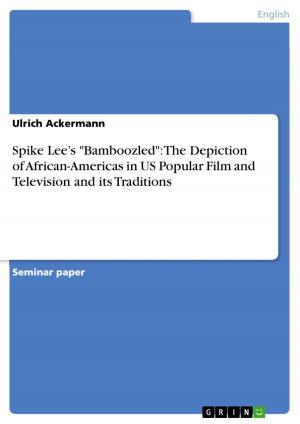Plagiarism in Peter Ackroyd's Fictional Biography 'Chatterton'
Fiction & Literature, Literary Theory & Criticism, British| Author: | Rositsa Kronast | ISBN: | 9783640571482 |
| Publisher: | GRIN Publishing | Publication: | March 22, 2010 |
| Imprint: | GRIN Publishing | Language: | English |
| Author: | Rositsa Kronast |
| ISBN: | 9783640571482 |
| Publisher: | GRIN Publishing |
| Publication: | March 22, 2010 |
| Imprint: | GRIN Publishing |
| Language: | English |
Seminar paper from the year 2009 in the subject English Language and Literature Studies - Literature, grade: 1,3, LMU Munich (Department für Anglistik und Amerikanistik), course: Hauptseminar Fictional Literary Biographies, language: English, abstract: By problematizing originality, authenticity and truth, this paper deals with the concept of plagiarism in a poststructuralist mode. It is especially concerned with the representation of plagiarism in Peter Ackroyd's fictional literary biography Chatterton. The question at stake is: how does Chatterton play with pla(y)giarism? This challenging task requires a concise discussion of the addressed issues, which will be the aim of the following introduction. It reflects on the essence of plagiarism and fictional biography. Plagiarism originates from the Latin word plagiarius, meaning kidnapper or thief, stealing slaves. (See Zwierlein 2000, 499) It was not until the 18th century, however, that the word began to designate an intellectual theft. At that time artists became financially independent from their patrons and had to assert themselves on the literary market. (See Ackermann 1992, 22) Plagiarism has been recently regarded as 'Anmaßung der geistlichen Urheberschaft: dadurch wird erstens der bewußte Akt der Übernahme betont, zweitens die Tatsache, daß der Plagiator als der Schöpfer des entlehnten Materials auftritt'. (Ackermann 1992, 18) According to this definition, plagiarism supposes, firstly, intentional arrogation of an intellectual work and, secondly, the plagiarist's claim to be the creator of the stolen material. This production-oriented view gives rise to the following questions: who acknowledges the assumption of other works and classifies it as plagiarism? and who decides whether it is intentional or not? I consider a psychological explanation of a plagiarist's motivation as an effect of readers' perception and presumption. The social, political and aesthetic norms, defining plagiarism, are results from a specific historic-cultural period. As previously mentioned, the word 'plagiarism' appears first in the 18th century in the sense of intellectual theft. Therefore, plagiarism is a social, cultural construct, which exists only by virtue of a collective belief or a contract, acknowledging a work of art as condemnable or praiseworthy. Apart from being contingent, the readers' value judgements depend also on non-textual criteria such as: 'the status and perceived genius of the authors, both plagiarizing and plagiarized; the status achieved by the plagiaristic text before the discovery of the 'plagiarism'; the national and patriotic interests of accuser and accused'. (Randall 2001, 4-5) Therefore, I consider plagiarism ...
Seminar paper from the year 2009 in the subject English Language and Literature Studies - Literature, grade: 1,3, LMU Munich (Department für Anglistik und Amerikanistik), course: Hauptseminar Fictional Literary Biographies, language: English, abstract: By problematizing originality, authenticity and truth, this paper deals with the concept of plagiarism in a poststructuralist mode. It is especially concerned with the representation of plagiarism in Peter Ackroyd's fictional literary biography Chatterton. The question at stake is: how does Chatterton play with pla(y)giarism? This challenging task requires a concise discussion of the addressed issues, which will be the aim of the following introduction. It reflects on the essence of plagiarism and fictional biography. Plagiarism originates from the Latin word plagiarius, meaning kidnapper or thief, stealing slaves. (See Zwierlein 2000, 499) It was not until the 18th century, however, that the word began to designate an intellectual theft. At that time artists became financially independent from their patrons and had to assert themselves on the literary market. (See Ackermann 1992, 22) Plagiarism has been recently regarded as 'Anmaßung der geistlichen Urheberschaft: dadurch wird erstens der bewußte Akt der Übernahme betont, zweitens die Tatsache, daß der Plagiator als der Schöpfer des entlehnten Materials auftritt'. (Ackermann 1992, 18) According to this definition, plagiarism supposes, firstly, intentional arrogation of an intellectual work and, secondly, the plagiarist's claim to be the creator of the stolen material. This production-oriented view gives rise to the following questions: who acknowledges the assumption of other works and classifies it as plagiarism? and who decides whether it is intentional or not? I consider a psychological explanation of a plagiarist's motivation as an effect of readers' perception and presumption. The social, political and aesthetic norms, defining plagiarism, are results from a specific historic-cultural period. As previously mentioned, the word 'plagiarism' appears first in the 18th century in the sense of intellectual theft. Therefore, plagiarism is a social, cultural construct, which exists only by virtue of a collective belief or a contract, acknowledging a work of art as condemnable or praiseworthy. Apart from being contingent, the readers' value judgements depend also on non-textual criteria such as: 'the status and perceived genius of the authors, both plagiarizing and plagiarized; the status achieved by the plagiaristic text before the discovery of the 'plagiarism'; the national and patriotic interests of accuser and accused'. (Randall 2001, 4-5) Therefore, I consider plagiarism ...















